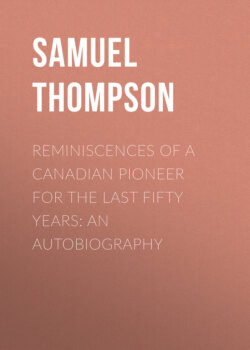Читать книгу Reminiscences of a Canadian Pioneer for the last Fifty Years: An Autobiography - Samuel Thompson - Страница 10
На сайте Литреса книга снята с продажи.
HISTORY OF A MAN OF GENIUS.
ОглавлениеTable of Contents
The course of my narrative now requires a brief account of my mother's only brother, whose example and conversation, more than anything else, taught me to turn my thoughts westwards, and finally to follow his example by crossing the Atlantic ocean, and seeking "fresh fields and pastures new" under a transatlantic sky.
John Isaac Hawkins was a name well known, both in European and American scientific circles, fifty years ago, as an inventor of the most fertile resource, and an expert in all matters relating to civil engineering. He must have left England for America somewhere about the year 1790, full of republican enthusiasm and of schemes of universal benevolence. Of his record in the United States I know very little, except that he married a wife in New Jersey, that he resided at Bordenton, that he acquired some property adjacent to Philadelphia, that he was intimate with the elder Adams, Jefferson, and many other eminent men. Returning with his wife to England, after twenty-five years' absence, he established a sugar refinery in Titchfield Street, Cavendish square, London, patronized his English relatives with much condescension, and won my childish heart by great lumps of rock-candy, and scientific experiments of a delightfully awful character. Also, he borrowed my mother's money, to be expended for the good of mankind, and the elaboration of the teeming offspring of his inexhaustible inventive faculty. Morden's patent lead pencils, Bramah's patent locks, and, I think, Gillott's steel pens were among his numerous useful achievements, from some or all of which he enjoyed to the day of his death a small income, in the shape of a royalty on the profits. He assisted in the perfecting of Perkins's steam-gun, which the Duke of Wellington condemned as too barbarous for civilized warfare, but which its discoverer, Mr. Perkins, looked upon as the destined extirpator of all warfare, by the simple process of rendering resistance utterly impossible. This appalling and destructive weapon has culminated in these times in the famous mitrailleuses of Napoleon III, at Woerth and Sedan, which, however, certainly neither exterminated the Prussians nor added glory to the French empire.
At his home I was in the habit of meeting the leading men of the Royal Society and the Society of Arts, of which he was a member, and of listening to their discussions about scientific novelties. The eccentric Duke of Norfolk, Earl Stanhope, the inventor of the Stanhope press, and other noble amateur scientists, availed themselves of his practical skill, and his name became known throughout Europe. In 1825 or thereabouts, he was selected by the Emperor Francis Joseph, of Austria, to design and superintend the first extensive works erected in Vienna for the promotion of the new manufacture of beet-root sugar, now an important national industry throughout Germany. He described the intercourse of the Austrian Imperial-Royal family with all who approached them, and even with the mendicants who were daily admitted to an audience with the Emperor at five o'clock in the morning, as of the most cordial and lovable character.
From Vienna my uncle went to Paris, and performed the same duties there for the French Government, in the erection of extensive sugar works. The chief difficulty he encountered there, was in parrying the determination of the Parisian artisans not to lose their Sunday's labour. They could not, they said, support their families on six days' wages, and unless he paid them for remaining idle on the Sabbath day, they must and would work seven days in the week. I believe they gained their point, much to his distress and chagrin.
His next exploit was in the construction of the Thames tunnel, in connection with which he acted as superintendent of the works under Sir Isambert Brunel. This occupied him nearly up to the time of my own departure for Canada, in 1833. The sequel of his story is a melancholy one. He made fortunes for other men who bought his inventions but himself sank into debt, and at last died in obscurity at Rahway, New Jersey, whither he had returned as a last resort, there to find his former friends dead, his beloved republic become a paradise for office-grabbers and sharpers, his life a mere tale of talents dissipated, and vague ambition unsatisfied.[1]
After his return from Vienna, I lived much at my uncle's house, in London, as my mother had removed to the pleasant village of Epsom in Surrey. There I studied German with some degree of success, and learnt much about foreign nations and the world at large. There too I learnt to distrust my own ability to make my way amidst the crowded industries of the old country, and began to cast a longing eye to lands where there was plenty of room for individual effort, and a reasonable prospect of a life unblighted by the dread of the parish workhouse and a pauper's grave.
